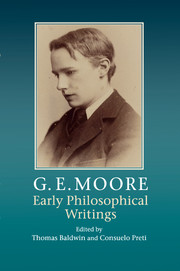Book contents
- Frontmatter
- Contents
- Preface
- Abbreviations and notes
- Editors' introduction
- THE 1897 DISSERTATION: THE METAPHYSICAL BASIS OF ETHICS
- EXAMINERS' REPORTS ON THE 1897 DISSERTATION
- THE 1898 DISSERTATION: THE METAPHYSICAL BASIS OF ETHICS
- Preface
- Table of contents
- Introduction
- Chapter I On the meaning of ‘Reason’ in Kant
- Chapter II Reason
- Chapter III The meaning of ‘Freedom’ in Kant
- Chapter IV Freedom
- Chapter V Ethical Conclusions
- Appendix on the chronology of Kant's ethical writings
- EXAMINER'S REPORT ON THE 1898 DISSERTATION
- Index
Chapter II - Reason
Published online by Cambridge University Press: 05 June 2012
- Frontmatter
- Contents
- Preface
- Abbreviations and notes
- Editors' introduction
- THE 1897 DISSERTATION: THE METAPHYSICAL BASIS OF ETHICS
- EXAMINERS' REPORTS ON THE 1897 DISSERTATION
- THE 1898 DISSERTATION: THE METAPHYSICAL BASIS OF ETHICS
- Preface
- Table of contents
- Introduction
- Chapter I On the meaning of ‘Reason’ in Kant
- Chapter II Reason
- Chapter III The meaning of ‘Freedom’ in Kant
- Chapter IV Freedom
- Chapter V Ethical Conclusions
- Appendix on the chronology of Kant's ethical writings
- EXAMINER'S REPORT ON THE 1898 DISSERTATION
- Index
Summary
The present chapter is intended to expound and support the ultimate philosophical position, which was presupposed in the last chapter. It was there attempted to express several of Kant's fundamental propositions in other words than those which Kant himself uses. This attempt must have been nugatory, unless some definite meaning had been attached to the words thus substituted for Kant's. But it is impossible to attach a definite meaning to words, without some definite view as to what are the ultimate facts or truths, which alone can be meant by any words. A word can have no meaning at all, unless its meaning can be expressed in terms denoting some actual fact or relation. It was necessary therefore to analyse Kant's thought into elements, which he perhaps did not recognise as ultimate, but which seemed to be the only ones to which any idea could have reference. In the course of this analysis more criticism was introduced, than was perhaps necessary for the purposes of mere exposition; but, so long as there is no agreement as to the ultimate data of philosophy, any fruitful exposition would seem to require some defence of the data presupposed as well against those of the philosopher expounded as against other possible objectors. Failing such direct contravention of accepted views, a new view can hardly be made even intelligible: and some view, it must be repeated, is presupposed in any exposition.
- Type
- Chapter
- Information
- G. E. Moore: Early Philosophical Writings , pp. 161 - 180Publisher: Cambridge University PressPrint publication year: 2011

